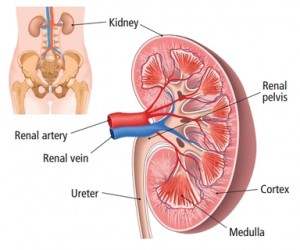KIDNEY HEALTH
Your kidneys are organs in your body that help to keep it working like your heart, lungs and liver. Most people have two kidneys, tucked away under your ribcage at the back. They lie on either side of the spine or back bone and are protected by the ribs and layer of fat to cushion the back muscles. They are about the size of a matchbox in a baby, and grow as you do till you are fully grown when they will be about the size of a grown up’s fist.
Your kidneys act like your body’s washing machine, getting rid of waste water and waste products in the form of urine (pee). All the food and drink that your body takes in goes through your stomach (or puku) and into your blood stream. It needs to be filtered or cleaned to make sure that you get the right amount of water and salts to keep your body happy. The kidneys help balance this. If you drink a lot, they will get rid of the extra water and if your body needs to hold onto water when you are not well, or on a very hot day, the kidneys make sure that this happens. Without them waste products and water would build up in the blood and you would get very sick.
They do lots of other jobs too. They help to produce red bloods cells which are needed for the body’s health and energy. They produce hormones to keep bones healthy. They help you grow taller and they help to control blood pressure. You don’t always need two kidneys to do all this work – many people have one and have a healthy life.
The kidneys work as part of a system called the urinary tract.
It’s easiest to think of the kidney system in two parts:
The kidney has two big blood vessels taking the blood in and out from the body to be cleaned. There are thousands and thousands of tiny filters and blood vessels inside the kidney that do the blood cleaning and make urine.
Even though your kidneys might seem little compared to the rest of your body, this filtering system has enough space to clean your blood hundreds of times a day. The filters produce urine that collects in the drainage system of the kidney.
There is an area in the middle of the kidney called the renal pelvis where urine collects before draining down tubes called ureters to the bladder. Urine collects in the bladder and when it is part full you get the urge to go to the toilet. Then urine gets out through a tube called the urethra.

Your child may require blood and urine tests and to have their blood pressure checked. Many structural kidney problems do not cause symptoms, but can be picked up on an ultrasound scan. Ultrasound is also used to check the urinary tract after problems such as having an infection. Having an ultrasound is painless and doesn’t involve any needles. Sometimes more detailed scans are needed that do involve needles, but your child can have a special numbing cream so they don’t feel the needle.
These scans are called nuclear medicine scans and they look for areas of damage or abnormality in the kidneys and what the overall function of the kidneys is. The blood tests look at levels of waste products in the blood called urea and creatinine. If these numbers are higher than expected for the child’s age, then this is a sign that the kidneys are not working properly. A more detailed way to look at how the kidneys are working is to measure something called the GFR or glomerular filtration rate which is more accurate in children. This can be done as a nuclear medicine test or from blood tests.
Some kidney problems are found on antenatal scanning. Sometimes your child may become unwell with signs of an infection such as fever and the infection is found to be in the urinary tract.
Kidneys that are not functioning well (chronic kidney disease) have very few outward signs, but people notice that their child is smaller than expected, tired and might have a poor appetite. There are no specific signs or symptoms of chronic kidney disease.
The diagnosis of chronic kidney disease requires simple blood and urine tests.
Chronic kidney disease usually gets worse over time and may eventually need treatment with dialysis and / or a kidney transplant. -Which is called End Stage Kidney Failure ESKF.